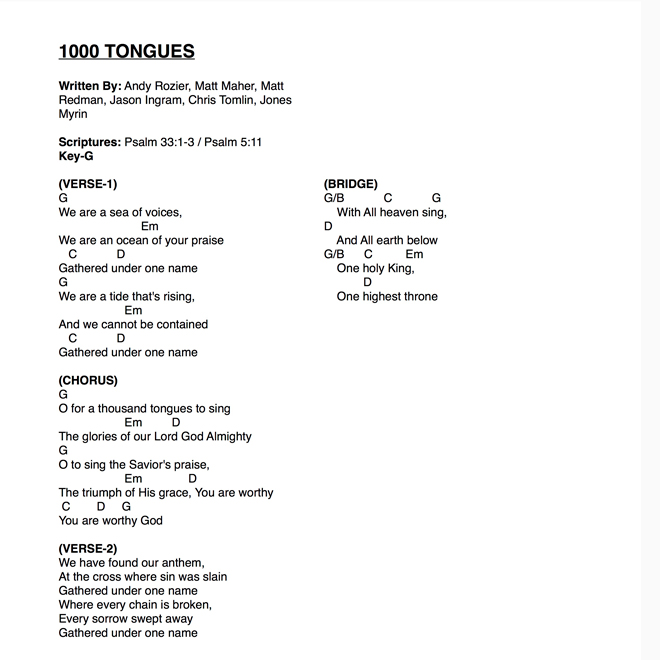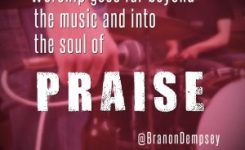Leaders, Piano, Players, Worship Leading
Six Ways To ReTrain Your Pianist (Show #94)
 #1000Tongues (Video Below)
#1000Tongues (Video Below)
4 min read
Taming the One Man Band
As a worship leader, you want your band to sound full. As musicians and singers, you want your music to flow. Making music unto the Lord brings joy, so how can we enrich the sound of our band, and what does this mean for piano and keyboard players?Most piano and keyboard players, but not all, come from a classically trained background; hymns and classical piano sonatas are most common from their music experience. Because of the nature of typical piano music or hymns, the piano player is responsible for all three major forms of song: melody, harmony and rhythm – all played by two hands.
Piano players are known for being the one-man band. Now if we were to create a band from each of these sections we would have three instruments: lead guitar, piano and bass. However, pianists are familiar with covering all parts in playing alone. When they join a band, they continue to play in the same mold. This is typical in many keyboard players in worship bands. What do you do? “Tie the hands,” – this was my exact response to a worship leader and pianist’s question from a WeekendWorkshop.
WATCH SHOW #94!
Song of the Week:
“1000 Tongues” Our song and theme this week is #1000Tongues inspired by the new release from “1000 Tongues” by Vertical Church
© 2016 Capitol CMG Paragon Andi Rozier, Chris Tomlin, Jason Ingram, Jonas Myrin, Matt Maher, Matt Redman. Get the song here from GuideTracks.co

Here are Six Ways to help retrain your pianist… Instead of the piano/keyboard player trying to Lone-Ranger all the music and playing all the parts, it is easier to break everything down by section. Use the analogy of the basic building block – the three person band: melody, harmony and rhythm (lead guitarist, pianist and bassist). Here each instrument is responsible for their individual part – not covering everyone’s part.
1. Let the bass play the left hand. Where does that leave the piano? Exactly, not playing the bass part. This means the pianist is to play in the middle register with tight chord voicings. It also means that the piano player is going to play half of what they would normally play.
2. Most often, people typically overplay/oversing their part. The easiest solution is to cut the music playing in half, then cut it down one half again into a quarter. You may be surprised how much you actually play and what you don’t play in a piece of music. Overall, your ear should be working harder than your hands in the form of listening. Try it out on your own and play your part in the team. Remember, less truly is more.
3. Avoid playing the melody and lose the right hand. The lead guitar will play the notes that are played in the pianist’s right hand. Take the music rhythms down by a half as well. In other words, instead of the piano player being responsible for every 8th and 16th note, let’s create a fourth member of the band and call him a drummer 🙂 The drummer is going to have the main job of keeping time on the high-hat, kick and snare. There you go! The pianist is freed up from all the responsibilities in being the one man band.
“Let the Holy Spirit be the melody of your music.” @BranonDempsey
4. Don’t double parts! Get out of the way of the vocalist(s). As a keyboard player, we want to musically support what is happening in the vocal lines. By playing the same melody that the other vocal leader is singing will sound static. It bleeds over the vocalist’s sound. Plus, doubling of parts in the same register by voice or instrument may thicken the sound, but if it is done poorly, bad tuning and intonation issues will be exposed.
5. You need to think of your self as 5 keys – not 88 keys. Each instrument has an equal part in making up the whole. There is an uncomfortable result. Having fewer notes to play does increase the impatience factor. Am I sure? When’s the last time you had a rehearsal without anyone noodling around and it was quiet? The same thing happens in music – everyone is making noodles and the song loses focus and shape.
6. Think horizontal not vertical. Focus on the other instruments in front of you, not the chart that’s in front of you. Think big picture of what you can add to the musical context. Instead of trying to play all the notes on the page, try to create an appealing environment for others to participate. Compliment musically to what others are doing.
Make music by your heart in being an instrument of His praise.
The lesson is about how to harness and control our playing into practical power. All musicians and pianists need to develop the art of playing less. What you will find is also an added new approach for creativity and exploration of music making.
@BranonDempsey @worshiptt  How can your worship team benefit from learning new vocals techniques, creative ideas for your band and be inspired to transform your ministry into worship unity? Get motivated. Get a custom WeekendWorkshop that comes to you!
How can your worship team benefit from learning new vocals techniques, creative ideas for your band and be inspired to transform your ministry into worship unity? Get motivated. Get a custom WeekendWorkshop that comes to you!
Copyright 2016 Worship Team Training®










7 Comments
Jamie Maynard
For the last six years, I have played piano/keyboard in an amazing praise band. We are blessed to not only have bass, drums, and guitar, but also a pretty cool horn section (plus violin!). As with many church bands, our there is a huge range of experience and skill levels among the players. As the piano/keyboard player and one of the more seasoned players, I would like to say this to those other “seasoned” piano players, we have an amazing opportunity to glue the band together. I always try to listen to what the other players are doing, and if there is a chance for them to “shine” I like to see it happen. For example, there are a lot of songs that have very melodic intros that are typically played by the keyboard, piano, or guitar, but what if you have a French horn in your band? Wouldn’t some of those melodic lines sound even better with the rich sound of the French horn, or the soulful violin or saxophone? Some of my best moments during musical worship is when one of the other players is soaring and I can see the offering of praise lifted high. On the other side of that are the times when some of the less experienced players are struggling. This gives us the chance to “stand in the gap” and give the player the support to they need to become their best.
branondempsey (Author)
Great word Jamie, thank you!
Bertram Sluys
Thanks, Branon. This is a good topic for discussion and you wrote some very good insights about it.
As a pianist who has worked in a few different situations both as worship director and as band member, I wanted to say a few things.
1. It’s very true that a pianist needs to play much more sparsely in a band than on his / her own. All the instruments do. Listening is indeed the most important part. For many years I played a synthesizer and a keyboard at the same time in a church band. Going completely against the way I normally play as a one-man band, I left all traditional-style piano playing behind and considered myself to be a team player by doing 3 things: 1. Finding an interesting sound on the synthesizer that would complement the song and not take it over. This way the keyboard adds texture and body to the overall sound. I actually kept a short list of sounds I thought worked well. When the director asked for a different sound I could go to the list to choose something more to her liking. 2. Pad playing. Sometimes one single note, sometimes two, sometimes the full chord held for entire measures. 3. Counterpoint. Since we had no other instrument to play the hooks, counter-melodies, etc. between the words and parts of the song I would normally fill those in when needed.
2. Don’t squash the spirit of the pianist / keyboardist. They may need special training to learn how to play by ear rather than following sheet music. And if they can’t hear themselves, or if the congregation can’t hear them, they will very likely start thinking “Why am I here?” That’s why I encourage synthesizer sounds instead of a piano. It’s much more likely to be heard; no matter how loud a piano is, it’s the only instrument whose sound starts decaying immediately and it therefore gets drowned out by the other instruments. Returning to a piano sound, there are songs where a piano lick or even a full verse of the piano being the main instrument is worth experimenting with.
3. I would beg to disagree with the piano never doubling up with other instruments. I think it depends a lot on the function and quality of the band as well as the expectations of the congregation. In our church, the main goal of the praise band is to give the congregation the best opportunity possible to fully engage in worship, which includes singing the songs with us. I do hear congregation members asking for more melody to be played on the instruments so they can follow and sing the melody. I’ve also found the piano and bass can play together effectively. Even the piano and guitar can play the strumming pattern together, but only if they’re playing exactly the same thing in exactly the same timing. That takes a lot of practice.
4. If a pianist is struggling to play anything other than one-man band music, there are opportunities to do just that in smaller churches. It’s become much harder to find pianists and organists to fill all the Sunday morning and evening slots for many of these smaller churches, and many are trying to find a happy medium between the traditional service and what is called “contemporary” music. Someone who can act as a one-man band on almost any kind of song is considered a huge asset to these churches.
branondempsey (Author)
Thanks Bertram for your input! Always great to have other perspectives. Where do you live/lead worship?
Ryan Goodbody
This article has some good points, I try not to be a one man show. We need humility. However, I would encourage sensitivity when telling this to your pianist. Not always but most of the time the pianist is as you stated coming from a “classical trained background”. This usually means they have a degree in music. Probably a performance degree. This means they have studied a lifetime (literally) to reach this level.
I myself studied for 18 years prior to receiving my degree. For a total of 22 years of study. When you have worked for this long it could be somewhat insulting to ask them to cut out the left hand entirely, and play less if it is not handled sensitively and by the right person. For example, a person who has played the guitar for a 3 years and has limited experience is probably not the right person for the task.
This is just my opinion however.
Your Brother in Christ,
Ryan
branondempsey (Author)
Thanks Ryan, all understood, appreciate you expressing your opinion. After studying piano for more than 25 years myself, I understand your point. This article is to help guide pianist in their approach to playing in a different way, in contributing to the contemporary band; not to completely discourage the use of the right or left hands. It is to make the point that less is more.
Ryan Goodbody
I understand what you are saying. I guess I would say “less is sometimes more”. It all depends on each bands unique abilities and needs. Thanks for your response.